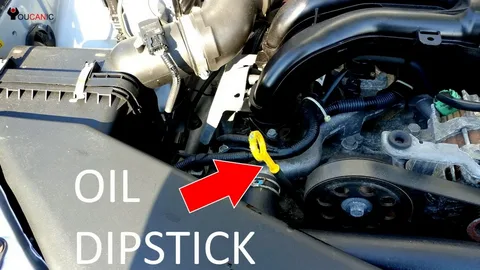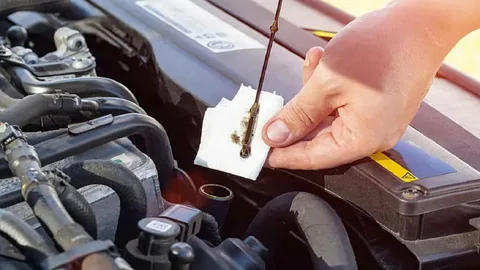If your engine oil smells burnt on the dipstick, there’s a good chance your car is overheating. This can be a serious problem, so it’s important to take steps to fix it as soon as possible. Here are some tips on how to troubleshoot and fix an overheating engine.
Contents
Why Does My Engine Oil Smell Burn on the Dipstick?
If your engine oil smells burnt on the dipstick, it’s likely that your engine is running too hot. This can be caused by a number of factors, including a low oil level, a restricted oil filter, or a problem with the cooling system. If you’re not sure what is causing the problem, have your vehicle checked by a qualified mechanic.
How Can I Tell if My Engine Oil is Burning?
If you notice a burning oil smell while you’re driving, it’s a cause for concern. The problem could be as simple as an oil leak or a loose oil cap, but it could also indicate a more serious issue.
If you check your engine oil dipstick and it smells burnt, that’s a sure sign that something is wrong. Burning oil can be caused by several factors, including:
- A faulty oil pump
- Excessively high engine temperatures
- Worn-out piston rings or valves
If you notice a burning oil smell, pull over and check your engine oil dipstick. If the oil looks black and gritty, or if the level is low, add more oil and continue driving. If the problem persists, have your car inspected by a mechanic as soon as possible.
What Causes Engine Oil to Burn?
There are several reasons why your engine oil might smell burnt. The most common is simply that the oil is old and needs to be changed. Oil breaks down over time and starts to form a sludge that can clog your engine and cause problems.

Another reason for a burning oil smell could be that your engine is running hot. This could be due to a number of factors, such as a bad thermostat, low coolant levels, or a problem with the cooling system itself. If your engine is running hot, it’s important to get it checked out by a mechanic as soon as possible to avoid serious damage.
Finally, if you recently had your oil changed and the burning smell started shortly afterward, it’s possible that the mechanic didn’t put the right kind of oil in your car. This isn’t necessarily a big deal, but it’s something you should have checked out so that you don’t end up causing any damage to your engine.
How Can I Prevent My Engine Oil From Burning?
There are a few things you can do to prevent your engine oil from burning:
- Change your oil regularly. Depending on your car’s manufacturer, you should change your oil every 3,000 to 5,000 miles, or every 3 months, whichever comes first.
- Check your oil regularly. You should check your oil level at least once a month, and more often if you notice that it’s burning more quickly than usual.
- Use the right type of oil. Consult your car’s owner’s manual to find out which type of oil is best for your car.
- Don’t overfill your oil. When you add oil to your car, be sure not to overfill it. If there’s too much oil in the engine, it can cause the oil to burn.
What Are the Consequences of Burning Engine Oil?
If your engine oil smells burnt on the dipstick, it’s likely that your engine is overheating. This can cause serious damage to your engine, including seized pistons and damaged cylinder walls. overheating can also lead to engine failure. If you notice any burning oil smell, pull over and call a tow truck immediately.
How Do I Know if I Need to Change My Engine Oil?
If your car’s engine oil smells burnt, it’s likely time for an oil change. Burnt oil usually indicates that the oil is old and needs to be replaced. It can also indicate that the oil has been contaminated with gasoline, coolant or other fluids. If you notice a burnt oil smell, check your dipstick and add more oil if necessary. You should also have your car inspected by a mechanic to determine the cause of the problem.
How Often Should I Change My Engine Oil?
Your car’s engine oil does a lot of work. It lubricates the engine’s moving parts, helps cool the engine, and prevents corrosion. Over time, though, the oil breaks down and starts to lose these properties. That’s why it’s important to change your engine oil regularly.

How often you need to change your oil depends on a few factors, including the type of engine oil you use and the conditions in which you drive. In general, though, most carmakers recommend changing your car’s engine oil every 5,000 to 7,500 miles.
If you drive under particularly severe conditions such as in stop-and-go traffic or in extremely hot or cold weather — you may need to change your oil more frequently. Some carmakers have started using synthetic oils that can last longer than conventional oils, so be sure to check your owner’s manual for specific recommendations.
You should also check your dipstick regularly to make sure that your oil level is where it should be. If it’s low, top it off; if it smells burnt, though, it’s time for a change.
What Are the Different Types of Engine Oil?
The most common type of engine oil is petroleum-based, but there are also synthetic, semi-synthetic, and bio-based oils. Petroleum-based oil is made from crude oil and is the most common type of engine oil. It’s also the least expensive.
Synthetic engine oils are man-made and designed to protect your engine better than petroleum-based oils. They can last longer and perform better in extreme temperatures. Semi-synthetic oils are a mixture of synthetic and petroleum-based oils. Bio-based oils are made from renewable resources like plants.
FAQs(Frequently Asked Questions)
Does a Burning Smell Mean Low Oil?
A pretty common issue that occurs with engines that are running low on oil is a strong burning oil smell. If you’re driving and you start to smell an oily odor coming from somewhere, that’s usually a pretty good sign your vehicle is due for an oil change.
What Are the Signs of an Engine Burning Oil?
- Smoke coming from under the hood.
- Blue exhaust smoke.
- Diminished performance.
- Reduced fuel economy.
Is It Normal to Smell Oil After Burning Oil?
Can Too Much Oil Cause Burning Smell?
Can I Still Drive My Car if It Smells Like Burning Oil?
Is It Expensive to Fix a Car Burning Oil?
What Happens if Engine Oil Overheats?
How Long Will a Car Last Burning Oil?
Conclusion
When the oil level in your vehicle gets too low or the oil gets old, you might start to smell burnt engine oil in one of its many forms while behind the wheel. These smells indicate that your car needs an oil change and that it’s time to schedule an appointment with your local maintenance center.
